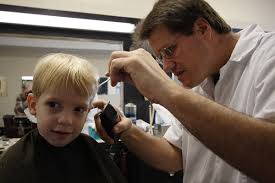barber
英 [ˈbɑː.bər]
美 [ˈbɑːr.bɚ]
- vt. 为…理发;修整
- n. 理发师
- vi. 当理发师
- n. (Barber)人名;(西)巴尔韦尔;(英)巴伯;(罗)巴尔伯
使用频率:

记忆方法
将“barber”与“bar”这个名词结合记忆。想象“bar”代表一个有界线的空间,比如一个理发店的门廊,这个“bar”是一个分隔区域,而在里面的人“barber”就是在进行剪发服务,这样就形象地记住了“barber”是指理发师。
以上内容由AI生成, 仅供参考和借鉴
中文词源
barber 理发师
来自拉丁词barba, 胡子,严格意义上指刮胡子的师傅。
英语词源
- barber
-
barber: see beard
- barber (n.)
- c. 1300, from Anglo-French barbour (attested as a surname from early 13c.), from Old French barbeor, barbieor (Modern French barbier, which has a more restricted sense than the English word), from Vulgar Latin *barbatorem, from Latin barba "beard" (see barb (n.)). Originally also regular practitioners of surgery, they were restricted to haircutting and dentistry under Henry VIII.
权威例句
- 1. She had to call a barber to shave him.
- 她不得不叫个理发师来给他刮脸。
- 2. She asked the barber to crop her hair short.
- 她叫理发师把她的头发剪短了.
- 3. The barber gave him a shave and a haircut.
- 理发师给他修面理发.
- 4. The barber thinned out his customer's thick hair.
- 理发师把顾客的浓密头发削薄了些.
- 5. I asked the barber for a trim.
- 我叫理发师把头发修剪一下.